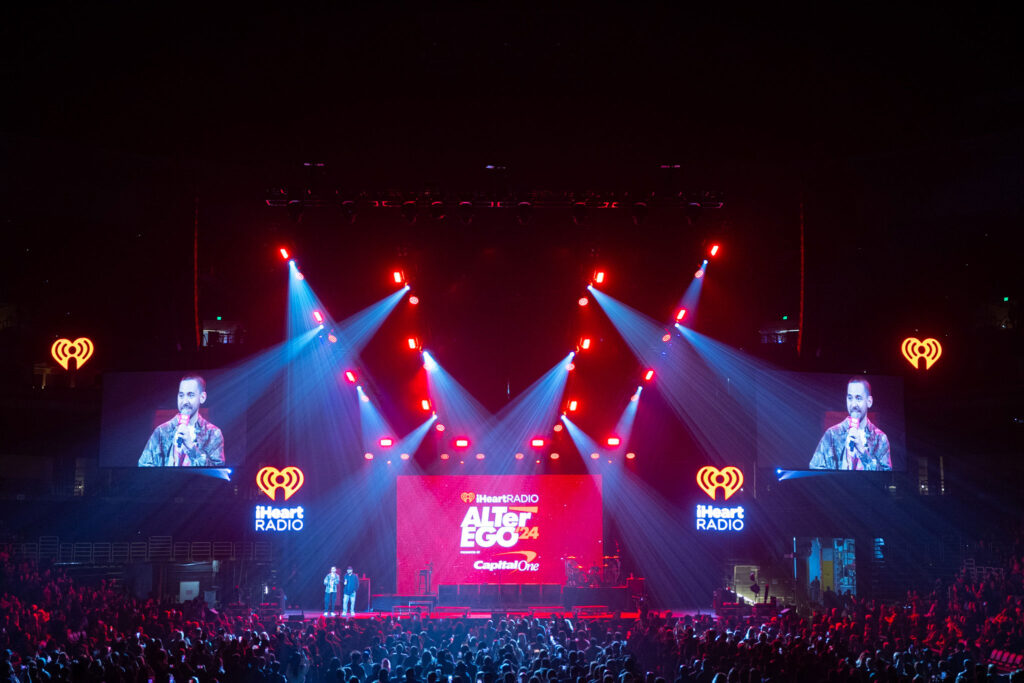Size matters! Well… not always, especially when it comes to the art of design, where it’s not always the size of a rig, but the way in which it’s deployed that makes the biggest impression. Patrick Dierson provided vivid proof of that at this year’s iHeartRadio ALTer EGO concert.
Although a procession of major stars like Fall Out Boy, 30 Seconds To Mars, The Last Dinner Party, Bush, The 1975, and Sum41 graced the Honda Center stage, the lighting rig for the event, which is traditionally held at the Kia Forum in LA, was smaller than it was in recent years.
The size of the rig, notwithstanding, the design team was given the mission of making the overall production for the nationally televised event, look bigger than previous shows.
“We wanted to make the show seem larger this year,” said Dierson of The Activity. “Yet, there’s no bravado when I tell you that this was literally the smallest lighting rig that I’ve been a part of in the past 20 or so years.”
Describing this challenge as “a blessed reality,” Dierson explained how it sharpened his creative visions. “It’s good to be forced to get more out of less,” he said. “That may be sort of an age old saying, but it’s also the truth. There’s certainly an ease that comes with a challenge where you can throw more gear at something. However, when you’re forced to accomplish more without that ability, your design talents are truly challenged — and that’s a nice thing to be forced to hone every now and then. It not only forces your design aesthetic in regards to stage architecture, but also your fixture choices become even more critical, because you really look toward those fixture models that can serve multiple purposes.”
Among the fixtures that helped Dierson accomplish this goal at iHeart ALTer EGO were 20 Maverick MK3 Washes, 16 Color STRIKE M strobe-washes in 30-channel mode, and 18 COLORado 2 Solos in SSP mode 9-channel. These CHAUVET Professional fixtures, like the rest of the lighting rig in this Diversified Production Services event, were supplied by 4Wall Entertainment.
Dierson flew eight of his Maverick MK3 Wash units across the farthest upstage truss, specifically to be utilized to create a backlight stage wash for talent. The balance of washes was positioned throughout the finger trusses, as were the COLORado pars, to add more stage wash, and, when needed, to fly out toward the audience. A group of four Color STRIKE M fixtures were also on upstage truss, while the other units were arranged throughout the rig.

“The output of the Maverick MK3 Wash was perfectly balanced to allow us to keep the intensity of the upstage video wall up while maintaining good punch on the stage,” explained Dierson. “We populated the Strike Ms in very much the very much the same fashion as our MK3 Washes, and for very much the same reasons. I wanted us to have the ability to utilize the upstage STRIKE fixtures as a very different looking stage wash. The tilt feature on them also gave us the ability to match their counterparts in the rest of the rig as audience blinders when desired.
“Over the past year or so, the STRIKE M has proven to be an extremely useful tool for us on a litany of productions,” continued Dierson. “In this instance, they were able to provide an overall audience wash for broadcast, and a powerful strobe effect, in addition to serving as audience blinders. They’re just so broad and powerful that they really lend themselves well to a wide range of uses.”
These and other features of the fixtures in his rig, helped Dierson achieve his ultimate goal of creating a big impression with a smaller rig. “To make the overall production design appear much larger, we tried to expose as much of the lighting rig to the audience as possible by both designing a splay of upstage to downstage truss orientations and then raking them at an extreme angle,” he said. “This led us to the four “fingers” of truss that spanned from 26 to 48 foot trim heights. We then staggered other elements such as our IMAG screens and scenic iHeart logos offstage and upwards to really open up the overall look.”
Not only did the resultant rig create a big impression, it also opened the door to an array of dynamic looks that came off well on television. Dierson credits the visiting LDs and his Associate Lighting Director Manny Conde with making this diversity come off.
“I can’t take credit for any of this diversity,” said Dierson. “Manny did an excellent job with the lighting console this year. He handled direction for a few of the artists not travelling with their own LDs, as well as making sure that all turnovers to those guests went seamlessly. Having someone of Manny’s caliber at the helm is always a confidence-builder. He has an incredible mastery of the console coupled with a great eye for design, so when we have him on the team, we know things are going to be handled at the highest level of quality. He’s also widely recognized by most guest LDs, and that simply puts everyone at ease no matter what scheduling challenges may arise.”
Conde was not the only one contributing to the success of this year’s ALTer EGO. Dierson also gives credit to technical producer Laura Paganucci, stage managers Seth “Berger” Goldstein and Scotty Chase, project manager Zack Guthimiller, programmer Keegan Sly, lighting crew chief David Leonard, video lead RJ Thomas, and 4Wall account lead Bob Suchocki.
“Everyone involved in this show deserves a lot of credit in helping us meet every challenge,” said Dierson. “I admit, there was a nervousness that came along with being throttled back to a smaller lighting rig this year.”
Looking back, Dierson says that such concerns were “completely unwarranted.” Anyone who saw this impressive (and big!) looking production would readily agree.